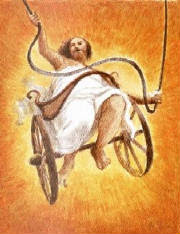
We sometimes are mean and selfish enough to realize we have more than others and instead of sharing or caring and trying to help, we only think that they might be dangerous and try to stay away. We don’t understand that we all have hard times in our lives, some different than others. When you help and show that you care, you will feel good and the person that you help will be happy to think they are important too and that they are being helped by someone else. This is a very interesting story and with many teaching that become perfect for the closure of this wonderful book. I really like how there are good people out of all the bad ones that might seem to exist and I really liked the way Baucis and Philemon treat Hermes and Zeus when they first see them. They were probably tired after so many people had been mean to them, and to find a welcoming and warm place must have felt like heaven. They treated them like old friends, people they knew, but when Zeus and Hermes asked they just answered the truth. “Why, you are children of god. Come in, come in” (pg. 79).This shows us how important we all are.
There is also the teaching of when you are good to others you will receive good things back, just like do to others what you want others to do to you. What if there was a time in our lives where we were that kind of people that needed help and there was none to help you because of how un-humble and selfish you always were. Everything has a consequence and depending to how we act we will end being happy of in terrible sadness. Baucis and Philemon were greatly blessed, because of being so nice to them and sharing the little and simple things they had. “Suddenly everything was changing. The poor little house, their simple cottage was becoming grander and grader, a glittering-marble colored temple. The straw and reeds of the thatched roof metamorphosed into gold, and gates with elaborate craving sprang up, as ground gave way to marble paving stones.” (pg. 82)
Last but not least we see one more about love, and how humble and caring Baucis and Philemon were. When they realized who were really there in their small house they were scared and just wanted to do more things to show how much their guests really were of importance. They, Zeus and Hermes decided to give them something else, whatever they wanted, and they weren’t selfish and asked for big unimportant things, but just asked to die at the same time, so one wouldn’t suffer for the other one that was missing. That I think is extremely lovely. It’s not like they asked to money to be given to them, or to be together and become immortal, but they asked to die at the same time. And they did, but they were also transformed into trees, which gave it a special touch to end with.











